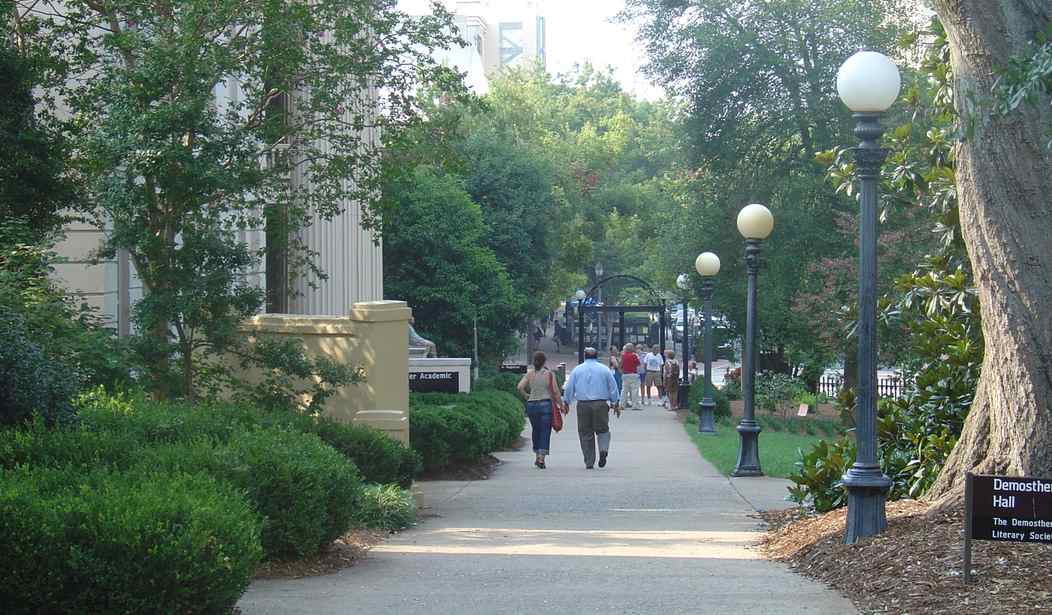The anti-Israel protests that have roiled college campuses nationwide grabbed headlines throughout the spring. Demonstrators dominated campuses like Columbia and UCLA, including encampments that lasted for weeks.
What you haven’t heard about as much is that other campuses didn’t experience the chaos that the headline-grabbing schools did. For instance, at the University of Georgia, protesters set up an encampment for a few hours before President Jere Morehead got the UGA police involved. Officers arrested six students for violations of the university’s code of conduct.
(Full disclosure: I am a UGA alumnus.)
UGA suspended the students pending a judiciary hearing. The students could have pleaded guilty and received a suspension that lapsed at the end of the summer semester, but instead, they pleaded not guilty and demanded a tribunal. What’s more, while a disciplinary hearing at UGA is normally private, the protesters demanded an open hearing. They got their wish.
“The six students — Zeena Mohamed, Isabelle Philip, Austin Kral, Ezra Lewis, John Hunter, and Lauren Heinze — spent nearly 13 hours presenting evidence to support the case against their suspensions in a formal hearing on July 30,” reports Zach Leggio at the UGA student newspaper, the Red and Black. “They used police body camera footage, expert and character witnesses, and state laws to argue that they did not violate the Code of Conduct and that their speech should have been protected.”
“University representatives presented video footage and police reports to argue that the students violated the Code of Conduct and violated UGA’s Freedom of Expression policy,” Leggio adds.
Recommended: The Morning Briefing: Israel's Enemies Are Getting Bolder by the Day
The panel, which WGAU reports consists of two students and a faculty member, found the six students guilty of five violations of the code of conduct. The university dropped an additional two charges.
The violations included “Intentional or reckless disruption or obstruction of teaching, research, administration or other University activities, including its public service functions on or off campus, or other authorized non-University activities taking place on University property with the exception of constitutionally protected freedom of speech and expression”; “Violation of published University policies, rules, or regulations”; “Failure to comply with directions of any University official, office or other law enforcement officer acting in performance of their duties and/or failure to identify oneself to these persons when requested to do so”; “Participation in a campus demonstration that violates the University’s Policy on Freedom of Expression, intentionally or recklessly disrupts the normal operations of the University or infringes on the rights of other members of the University community”; and “Acting in concert to violate University conduct regulations.”
The panel dropped the charges involving “threatening or injuring others” and “unauthorized entry into property.” Most tellingly, Leggio reports that the panel stated that the protest was “not constitutionally protected freedom of speech and expression” because the demonstrators didn’t respect the “time, place and manner restrictions in the UGA Freedom of Expression policy.”
The panel’s decision bans the students from campus until Jan. 1, 2025, and they cannot register for classes until the spring 2025 semester. Furthermore, they will remain on probation as long as they are students at UGA. Any further violations of the code of conduct will result in additional suspensions. The students have the right to appeal, and they said they plan to.
“Out of the thousands of expressive activities held on campus at the University of Georgia last academic year, only one led to arrests: the morning of April 29, 2024, when well-organized protesters planned an event in willful violation of University policy, formed a clearly prohibited encampment on our historic North Campus Quad, and refused repeated warnings to either comply with policies or disperse,” UGA spokesman Greg Trevor said in a statement.
Good for the University of Georgia and President Morehead. I wish other administrators had been as stringent in getting rid of radical protests on their campuses.










Join the conversation as a VIP Member